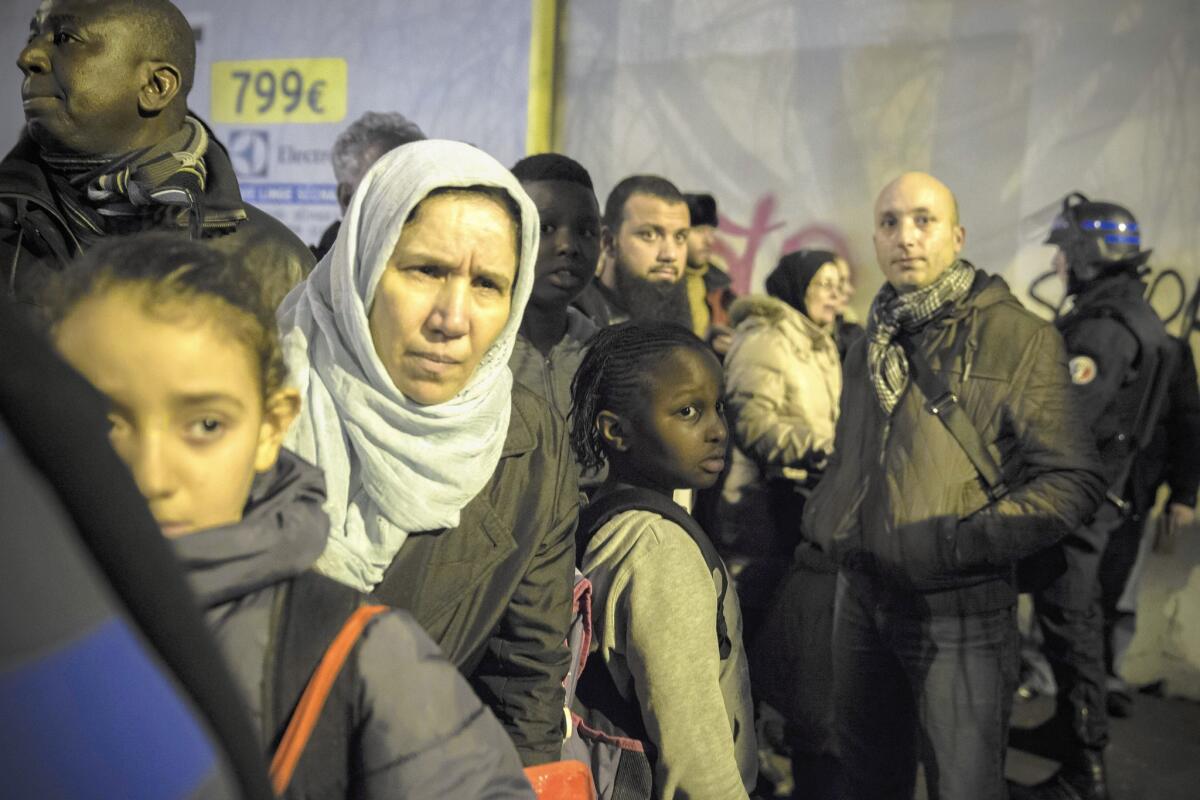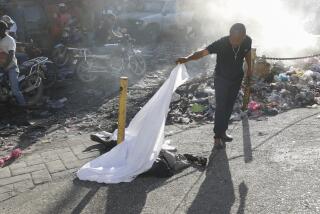Hostage ordeal briefly paralyzes a Paris neighborhood

Marie Elong embraced her daughter in relief as the 11-year-old raced through the doors of her school in the city’s Porte de Vincennes district.
“I was so worried,” the sobbing mother said, hugging the girl, whose eyes also filled with tears. “No one thought something like this could happen here.”
For more than four hours on Friday, a large swath of this animated, densely populated district of eastern Paris was largely paralyzed.
The neighborhood’s varied inhabitants, including large immigrant populations from sub-Saharan and northern Africa, along with a substantial Jewish community, endured a kind of collective ordeal as part of the running drama that has consumed this capital since gunmen on Wednesday murdered 12 people at the offices of Charlie Hebdo, a satirical magazine. Porte de Vincennes became a kind of microcosm of a shocked Paris.
The Charlie Hebdo killers, two brothers of Algerian origin, made their last stand in a rural enclave near Charles de Gaulle International Airport. Both were gunned down Friday afternoon by police.
Their apparent confederate in Islamic radicalism, Amedy Coulibaly — a suspect in the killing on Thursday of a policewoman in southern Paris — decided to hole up in a kosher market, Hyper Cacher, in Porte de Vincennes.
Authorities descended on the zone in force, severely disrupting the daily routine.
Barricades blocked streets. Public transportation was suspended. People were on lockdown inside their homes. Children, including Elong’s daughter, were trapped in their schools as the afternoon dragged on.
Ambulances and minivans filled with heavily armed lawmen in full riot gear careened through the streets. Sirens were nonstop. Knots of area residents, along with journalists, gathered at vantage points along the metal barricades.
The simultaneous hostage crises stunned Paris just two days after the shocking attack at a magazine office in the heart of town.
Edgy residents of Porte de Vincennes craned their necks out their windows, watching the spectacle, worry evident on their faces. Arguments broke out along the police barricades. The emotion of the moment appeared to frazzle many people’s nerves in this largely working-class district.
By midafternoon, many parents at the cordon points were asking police if they could go collect their children from schools inside or on the edge of the barricaded zone. But schools were not letting pupils out early. And police were not allowing civilians through the barricades.
“I want to get my son out of school,” a Senegalese woman, Binta Gay, pleaded with a helmeted police officer along the blocked-off area.
“I’m sorry, madame,” the policeman replied. “No one can pass.”
A few minutes later, a man from Mali — dressed in a white robe and matching skullcap — hustled his three sons through a curious crowd along the barricades. He had managed to get them out of school.
“I just want them home and safe,” said the man, who gave only his surname, Baradi, before rushing off to the family home. “It all feels very unsettling now.”
Discussions flared along the barricades as the hours dragged on. Journalists seeking quotes pounced on a pair of yeshiva students passing through. They declined to say much.
“God is protecting us,” said one of the students, Mendel, 18, who said he was visiting from Brooklyn, home to many Hasidic Jews. “We are in God’s hands.”
Whether the hostage-taker deliberately targeted the kosher market because of its Jewish clientele remained unclear.
At one school just inside the barricades, the Lycee Helene Boucher, bored students opened top-story windows and began waving to crowds along the barricades. Police on the street advised them to stay inside.
At about 4:30 p.m., the schools began to empty. Worried parents converged as students began to trickle out.
“We were all really scared. We didn’t know what was going on,” said Sophie Moravcik, 15, a student at Lycee Maurice Ravel, a high school. “We’re all happy to be out.”
Classmate Lilian Gonzalez described a stressful environment, with classes largely suspended and everyone wondering what was going on with all the police activity outside.
“We all wondered what was going to happen,” Gonzalez said, as he and others waited for their parents to show up.
Up the street, Marie Elong embraced her daughter as she came out of the school.
“We waited for a long time,” said the daughter, also named Marie. “I’m hungry. I just want to go home.”
Soon, a flurry of ambulances and police vehicles passed through the barricades. At about 5 p.m., three detonations were heard from inside the cordon: Police had stormed the Hyper Cache Market. Soon, several ambulances exited the area, drawing cheers from along the barricades. The drama appeared to have ended, with the deaths of Coulibaly and at least three hostages.
Video released later showed several SWAT teams entering the market by force. One group edged up to the store behind an armored vehicle. Some officers fired through the front door. Terrified hostages staggered into the street. One man carried a young boy.
A few hours later, people living on the street were finally allowed to return to their homes. Several hundred had waited for hours outside the barricades along a small street called Rue du Commandant L’Herminier, named after a 19th century military commander in Casablanca.
Among them was Gosenau Damois, who held the hand of her 8-year-old son. Both appeared deeply distressed. She said she lived above the Hyper Cache Market and watched the whole drama play out on television, trapped in her apartment, terrified that the trouble would migrate upstairs.
“I heard the explosions, the gunshots. I lived through it all,” she said, as she clutched her son close to her on the chilly street.
When it was over, she said, she ran to her son’s school to find him. Now both were together, but shaken.
“This is usually a pretty tranquil area,” Damois said as she waited to go through the police lines, back to her home. “We never could have imagined such a thing.”
Twitter: @mcdneville
More to Read
Start your day right
Sign up for Essential California for news, features and recommendations from the L.A. Times and beyond in your inbox six days a week.
You may occasionally receive promotional content from the Los Angeles Times.






